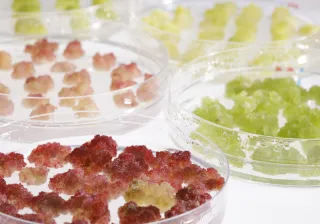Did you know that in order to feed all the people in our planet in the year 2050, the production of protein used in food and feed should be doubled? To be successful in the markets, alternative sources of protein require increased awareness among consumers and production processes that have been proven to be sustainable.
The volume of food production cannot be essentially increased with current methods without also causing extensive load to the environment. Therefore, it is necessary to develop innovative and sustainable food solutions, such as alternative protein sources and new production technologies. This is what food revolution means.
VTT is a partner in an EU-funded NextGenProteins project, where new technologies for protein production are developed by bioconversion of underutilized resources. In addition, the project examines the future market potential for food and feed products containing alternative protein ingredients. The focus is on spirulina microalgae using CO2 emissions and waste heat for growth, insects (crickets and larvae of black soldier flies) growing on by-products of food industry, and Torula yeast (microbe) cultivated on forest biomass. The figure below illustrates the production process in more detail.

”All of the studied alternative sources of protein could be produced in an industrial scale already in the near future”, says Principal Scientist Jaakko Paasi from VTT.
Sustainability is important, but it must be proven
The views of European companies in the food and feed value chains towards the new alternative proteins were studied in the project. How do the companies see the future of food production?
According to the company respondents, the large-scale application of the studied protein sources is in the far future, but their development was still seen highly important. Jaakko Paasi notes, that the results of the study give answers to what should happen before products including alternative protein ingredients could successfully enter the markets. Three main themes arose from the findings:
- Increasing awareness. The majority of people (both consumers and business actors) do not know what to say about alternative proteins sources and products including such ingredients. Many people are not aware about the facts regarding the need for these kinds of solutions. A general and dispassionate discussion regarding the future of food production is needed, including more information on the production of alternative proteins, their sustainability, benefits and potential risks.
- Consumer acceptance. Actors in food value chain share a joint concern whether the consumers will accept new protein sources and their production processes. If consumers can do that, business actors will surely follow.
- Sustainability must be proven. Companies consider the sustainability of food production highly important. At the same time, they say that there is a lot of misinformation available around sustainability. Therefore, the sustainability of any new product and production process must be validated, and the whole production chain must be transparent. They also stated that environmental sustainability alone is not enough. Business must be sustainable also economically.
Although the wide utilization of alternative protein sources in the mass markets for food and feed is seen to be far away, there is a clear market potential for niche applications already in the near future. “In niche markets, a product must differentiate from the mass market products and give special added value to a customer”, Paasi states.
How do Finnish business actors see the potential of alternative proteins?
Answers from Finnish companies were in line with actors in other European countries. Several respondents expressed their interest in piloting new products with alternative protein sources. Although we may not find Torula yeast pasta from our supermarkets in the near future, the business opportunities related to the application of alternative proteins should be investigated now.







